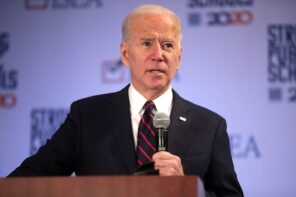Or so say Penny Nance, president of Concerned Women for America, Ralph Reed, founder of the Faith and Freedom Coalition, and Joel Rosenberg, convert from Judaism and author of numerous end-times-themed novels.
Yesterday, the trio published a piece in the Christian Post, arguing that the 2016 “evangelical primary” is already underway, and that “no one seeking the GOP nomination in 2016 can afford to ignore this vital and dynamic constituency. There is simply no viable road to the presidency for a Republican candidate who fails to win strong support from voters of faith.”
This argument is, of course, so familiar that it could have been written in 2000, or 1992, or 1988. It contains the usual warnings that politics alone can’t solve America’s problems (“America needs the help of Divine Providence,” “we need a new Great Awakening”). “Life” and “marriage” are listed as the #1 and #2 issues. “Israel and Radical Islam” come in at #5 (after religious liberty and national security), but one could see them being moved up a notch or two if violence continues to escalate:
Does the candidate have a clear and coherent view of U.S. vital interests in the Middle East, including a demonstrated, consistent, long-standing support for Israel and a solid understanding of why Israel matters to the U.S.? Does the candidate have a clear understanding of the urgency of the threats posed by Iran, ISIS, and Radical Islam more broadly, and a serious approach towards dealing with such threats? Does he or she have proven wisdom and experience in dealing with the Middle East issues, or is the candidate too new to the foreign policy arena?
In light of yesterday’s terrorist attack on a Jerusalem synagogue, Nance, in a statement, calls Israel a “cornerstone” for the 2016 presidential nomination, adding, “continued violence in Israel and constant turmoil in the Middle East makes a clear and comprehensive foreign policy agenda a must for any potential conservative presidential candidate.” Concerned Women for America, long chiefly concerned with domestic issues, recently added Israel to its advocacy agenda. Last month, the group hosted a pro-Israel—or, more accurately, pro-Netanyahu—rally on Capitol Hill. The clear message of the rally: the conflation of “American values” with “standing with Israel.”
As has been the case for several election cycles, reports of the demise of the religious right have been greatly exaggerated. While their overall numbers may be declining, conservative white evangelicals are still highly motivated to vote, as demonstrated in the midterm election this year. For the midterms, they were motivated by what politicians cast as religious liberty issues, but it’s not a stretch to imagine who those issues could be entwined with Israel. Advocacy groups already have been casting the political arrangements on the Temple Mount as a threat to the religious freedom of Jews (and Christians).
For the religious right, religious liberty succeeds as a get-out-the-vote motivator because it taps into dual passionate beliefs and fears: first, that America is not just a nation of Christians, but a nation guided and governed by conservative Christian imperatives; and second, that forces working against America’s status as a “shining city on a hill” endanger that Christian identity and America’s future.
Of course Israel has always been an issue in presidential campaigns, but the current situation on the ground, along with a growing number of Christian right political players adding it to their advocacy agenda, will likely catapult it into the forefront in 2016. (The most interesting horse-race thing to watch here will be the battle between the Ted Cruz and Rand Paul camps.)
When the candidates try to outdo each other with boasting of their “pro-Israel” credentials, it will likely trigger the inevitable can-the-Republicans-win-over-the-Jewish-vote debates. But those discussions will miss the real story. It won’t be Jewish voters the candidates are trying to reach.




